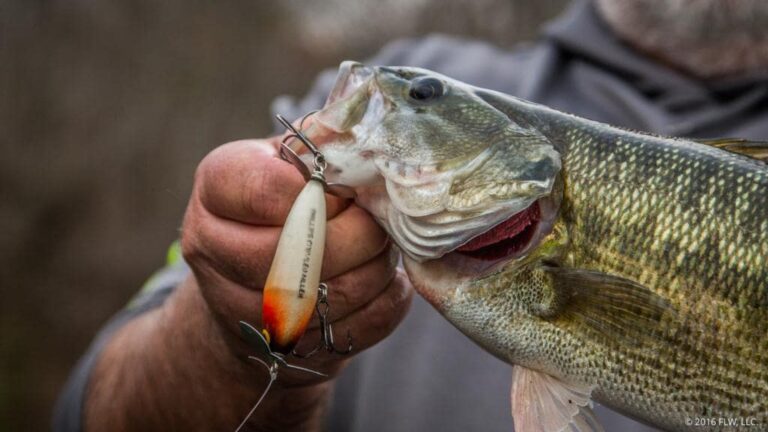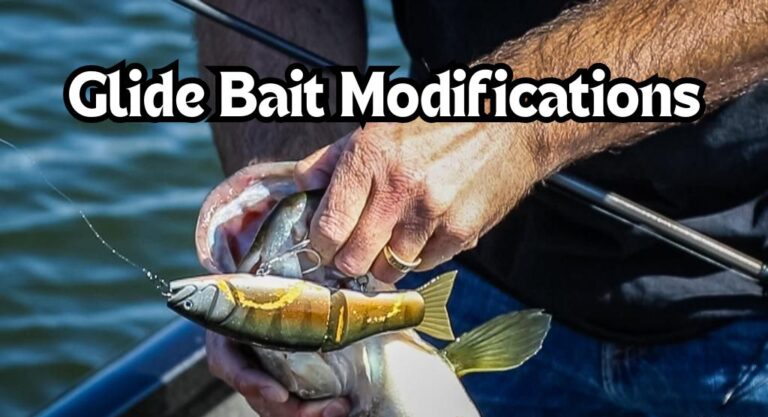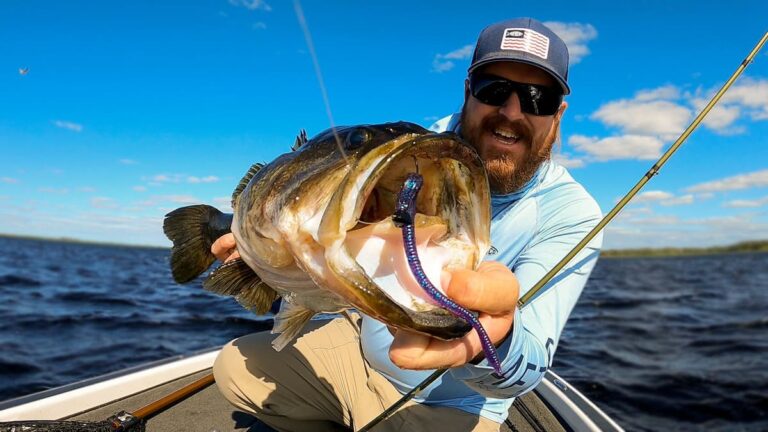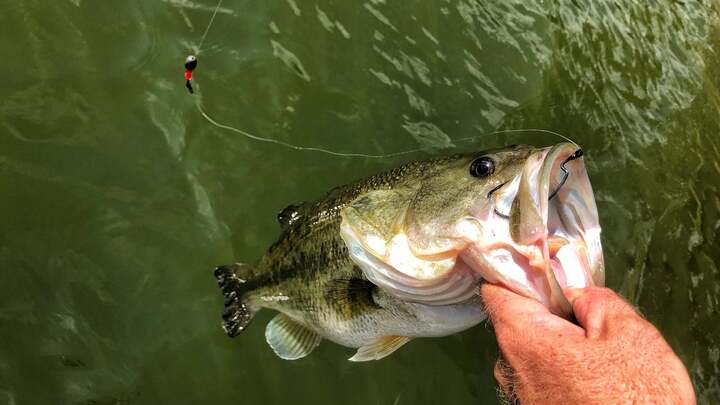Wacky Rig Fishing for Bass: Guide to Using the Wacky Worm Rig
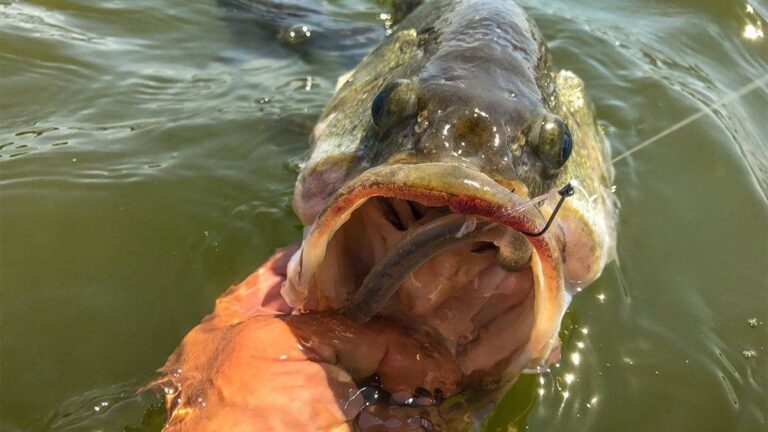
When I was a kid, the wacky rig caught me more bass than any other lure.
It is an incredibly simple and easy to use rig that catches tons of bass.
No matter what season it was, when the bite got tough, I tied on a wacky rig and instantly caught more fish.
Wacky rig fishing for bass is a fool proof strategy that produces tons of bites.
Wacky Rig Setup

The Wacky rig is a bass fishing technique that involves rigging a soft plastic bait right through the middle.
It’s all about presentation and tempting those fish with an irresistible offering.
- Soft Plastic Bait: Stick baits and finesse worms are the best soft plastics for the wacky rig. You want the symmetrical profile that these baits provide.
- Hook: A wacky hook works best as it is much more compact and light weight. However, if you are in a pinch, using an EDG worm hook will work just fine.
- Weights (Optional): Depending on the fishing conditions, you may want to add a small weight to your Wacky rig to help it sink faster or stay at a specific depth. This is totally up to you and the situation you’re fishing in.
Advantages of the Wacky Rig for Bass
- First off, the Wacky rig is a superb choice when you want to target those finicky bass. Why? Because it offers an incredibly natural and enticing presentation. The soft plastic bait, rigged through the center, wiggles and undulates in the water. And guess what? Bass just can’t resist it!
- Another great advantage of the Wacky rig is its versatility. You can fish it in various situations and environments. You can rig it up on a hook with a weed guard, allowing you to fish the wacky rig in all sorts of cover.
- Now, let’s talk about its simplicity. The wacky rig is just a hook through the middle of the worm. It doesn’t get much simpler than that.
Equipment Setup for Wacky Rig Fishing
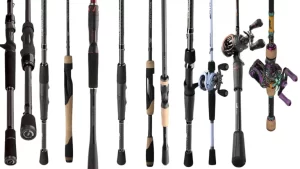
Rod and Reel
The wacky rig is a finesse rig, so it should be fished on a finesse setup. A 6’10”-7′ medium power spinning rod is my favorite.
I prefer a fast action rod for a bit more sensitivity, but a little more backbone so I can get proper hook sets.
Line
You don’t want to use braided line. Fluorocarbon and monofilament are much more invisible, making them better finesse fishing lines.
Ideally, fluorocarbon works best because of the low visibility and lack of stretch. But it is also expensive, so monofilament works just fine.
How to Fish a Wacky Rig
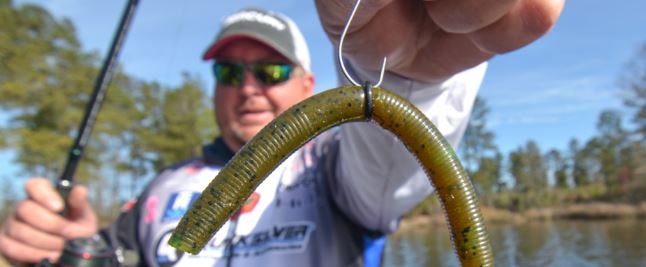
Now that your Wacky rig is all set up, it’s time to learn how to work the bait effectively.
Mastering the proper techniques will help you maximize its fish-catching potential. Here’s a guide on working the bait like a pro:
- Cast and Let it Sink: Start by casting your Wacky rig to your desired target area, whether it’s near structure, along weed lines, or around cover. Allow the bait to sink naturally, maintaining a bit of slack in your line.
- Lift and Drop: Once the bait has settled on the bottom, it’s time to start working it. Begin by gently lifting your rod tip, causing the bait to rise off the bottom. Then, let it fall back down, imitating a wounded or struggling prey. Repeat this lift and drop motion, creating a subtle and enticing action.
- Twitching and Shaking: Another effective technique is twitching and shaking the rod tip. This imparts quick and erratic movements to the bait, mimicking a distressed or injured creature. Make small, sharp twitches with your rod tip, causing the bait to shake and quiver enticingly.
- Experiment with Speed and Cadence: Vary the speed and cadence of your retrieves to find what triggers the bass in different situations. Sometimes a slow, subtle presentation works best, while other times a more aggressive and faster retrieve gets their attention. Don’t be afraid to mix it up and adapt to the fish’s preferences.
- Pay Attention to Strikes: When a bass strikes your Wacky rig, you might feel a subtle tap or notice your line twitching. Stay alert and be ready to set the hook. Sometimes, bass hit the bait on the fall, so be prepared for sudden bites as the bait descends.
Adjustments Based on Water Conditions
- Clear Water: Use natural-colored baits, employ subtle movements, and slower retrieves.
- Stained or Murky Water: Opt for brighter or contrasting colors, increase rod twitches, and use more intense movements to create vibrations.
- Vegetation or Weedy Areas: Trim bait’s tail, use weedless hooks, and employ slow, methodical retrieves.
- Deep Water: Adjust weight for desired depth, experiment with sink rates and retrieve speeds, maintain contact during the fall.
- Shallow Water: Use lighter weights or go weightless, allow bait to glide and flutter, employ slow twitches or let it sit motionless.
Location and Seasonal Considerations
Like I mentioned earlier, the wacky rig is a year round bass fishing setup. No matter the season, bass can’t resist the inch-worm action of the wacky rig.
My favorite time to fish a wacky rig is the dog days of summer. During the hot, grueling, summer days, it can be hard to get bass to bite.
Power fishing is out of the question for these days. But the finesse approach of the wacky rig can get these bass to bite.
Shallow water drop offs and cover are the best locations to hone in on some hot summer bass.
Tips for Wacky Rig Bass Fishing
- Experiment with Bait Colors: Try different colors to find what bass are most responsive to in specific conditions. Natural and vibrant hues can be effective choices.
- Vary Your Retrieve: Mix up your retrieve speed, cadence, and the length of pauses to trigger reaction strikes from bass. Experiment with both subtle and more aggressive movements.
- Target High Percentage Areas: Focus on prime bass holding areas like points, drop-offs, weed edges, and structure-rich areas. These spots tend to attract more fish.
- Pay Attention to Water Temperature: Monitor the water temperature as it affects bass behavior. Adjust your presentation and depth based on their preferred temperature ranges.
- Use Lighter Line: Opt for lighter line or fluorocarbon leaders to increase the bait’s natural action and enhance sensitivity for better bite detection.
- Practice Proper Hook Sets: When you feel a bite or see a line twitch, resist the urge to set the hook immediately. Give the bass a split second to fully take the bait before setting the hook with a firm, upward sweep.
- Stay Persistent and Observant: Bass behavior can change throughout the day. Stay patient, observe fish movement or feeding patterns, and adapt your tactics accordingly.
- Pay Attention to Weather Conditions: Factors such as wind, cloud cover, and changing weather patterns can impact bass activity. Adjust your presentation and location based on these conditions.
Soft Plastics for Wacky Worm Rig
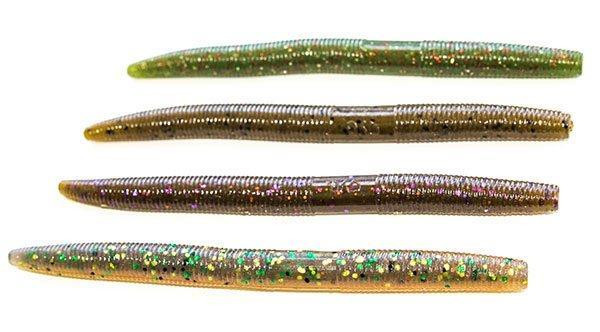
- Stick Baits: Oh, the classic stick bait! These slim, elongated baits mimic the natural shape of worms or small baitfish. Their subtle wobbling action as they sink is simply irresistible to bass. Try them in various lengths and colors to match the forage in your fishing area.
- Senko Worms: Ah, the Senko worms! These bad boys have become a staple in many anglers’ tackle boxes. Their unique design and soft texture create an enticing fall and wiggling action. Bass find it hard to resist their seductive charm. Experiment with different sizes and colors to see which ones the bass prefer.
Recap of Wacky Rig Worm Fishing
- The Wacky rig is a popular bass fishing technique known for its natural and enticing presentation.
- Components of the Wacky rig include soft plastic baits, Wacky hooks, O-rings (optional), and weights (optional).
- Advantages of the Wacky rig include its natural action, versatility, simplicity, and ability to generate bites.
- Equipment needed for Wacky rig bass fishing includes a fishing rod and reel, fishing line, Wacky hooks, soft plastic baits, O-rings, and weights (optional).
- Attaching hooks, weights, and soft plastic baits involves threading the hook through the bait, using O-rings for added durability, and adding weights if desired.
- Working the bait effectively includes techniques such as lifting and dropping, twitching and shaking, deadsticking, and varying retrieve speed and cadence.
- Adjusting the presentation based on water conditions involves considering clarity, vegetation, depth, and other factors to adapt the Wacky rig for optimal results.
- Location and seasonal considerations include identifying prime bass fishing locations, targeting cover and structure, and adjusting tactics based on the season.
- Tips for success in Wacky rig bass fishing include experimenting with bait colors, varying the retrieve, targeting high percentage areas, paying attention to water temperature, and staying persistent and observant.
- Troubleshooting and common challenges involve dealing with snags and hang-ups, modifying the rig for specific scenarios, adjusting the presentation for finicky bass, and adapting to changing conditions.
Putting this in the Net
In conclusion, the Wacky rig bass fishing technique offers an exciting and effective approach to landing those elusive bass.
Armed with the knowledge of rig setup, bait selection, and presentation techniques, you’re ready to hit the water and put your skills to the test.
Stay adaptable, persistent, and enjoy the thrill of reeling in those bass with the Wacky rig. Tight lines and happy fishing!



